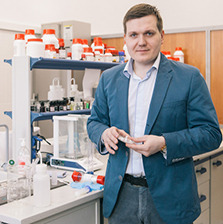
The chemical synthesis of metamaterials — including the synthesis of metal-organic frameworks (MOFs) is one of the most essential research areas worldwide. Still, only few research teams in Russia do research in this field — one of them being from ITMO University. Researchers from SCAMT International Laboratory in collaboration with their colleagues from the Department of Nanophotonics and Metamaterials published a review article on the topic in ChemicalSocietyReview, a most trusted scientific magazine for chemists.
Why Publication is a Figure of Merit
The publication of a review article in ChemicalSocietyReview magazine with a high impact-factor of 34 is not just a result of yet another stage of own research and analysis of other publications in the field. Most importantly, this is a result of highly qualified work of trusted international teams that form new directions in science based on unique inventions and research.
«We are really proud that this review has been prepared by our laboratory. This shows that we are one of the leaders in metal organic framework synthesis, and a center for interaction between different scientists in this field. Our students got a chance to use unique analytical and synthesis systems, as well as take part in discussing promising science projects. Most of the SCAMT Laboratory's staff are under 27, and our progress mostly depends on our Master's and Research student's enthusiastic work», — notes the article's co-author, Alexandr Vinogradov.
For instance, most of the work on the review has been done by Master's student Leila Mingabudinova.
«One has to understand that being an author of such a review implies that the scientist is highly competent in the field and possesses deep fundamental knowledge and understanding of the trends in the area. These reviews generally have a high number of citations, especially in high-impact magazines, which significantly increases the Hirsch Index of the researcher and the university's reputation», — shares Alexandr Vinogradov.
What's more, most of the authors of the review are staff from ITMO university, the foreign co-author being a world-renown scientist, professor Evamarie Hey-Hawkins from the University of Leipzig. The professor is one of the leaders of project's «Horizon 2020» subprograms, — the project finances the most promising research in the EU.
«Taking into account the results of our scientific cooperation for the last four years, we've decided to publish a joint review dedicated to interdisciplinary research on creating metal organic monocrystals with unique physical properties», — explained Alexandr Vinogradov.
What's so great about chemical synthesis of metamaterials?
The review's authors explain that metal organic frameworks are a great step in the development of metamaterials. MOFs possess a distinct set of electronic properties of organic and metal elements, which allows to create three-dimensional structures with properties that can greatly exceed those of metamaterials created with physical means. But the most important thing is that they can be easily scaled and introduced into everyday practice.
«One can create a metal organic framework using a „natural“ way: put the substances in the reactor, set the necessary conditions, and the material will grow itself. This substances have an enormous surface area, up to ten thousand square meters per gram. It is sure hard to imagine such values, but it's most important for catalysis, hydrogen sorbtion, gas separation and even drug delivery. As it turned out, these properties are essential for creating quantum and non-linear optics metamaterials as well, as it allow to reduce the difficulty and costs of their production», — notes Alexandr Vinogradov.
SCAMT's perspectives
During the last two years, the laboratory has conducted research and published articles in high-ranking magazines, opened several new programs, including the laboratory of ink-jet printing, magnetic nanosystems, nanotoxicology and prototypization, as well as increased its collaboration with foreign colleagues considerably. This year, the competition for positions at the SCAMT Laboratory for Master's students was 8 to 1.
The collaboration with the University of Leipzig is to be continued in the nearest future — Master's and Research students from ITMO will participate in an internship program there within the framework of the Erasmus+ program.
(author Natalia Blinnikova)